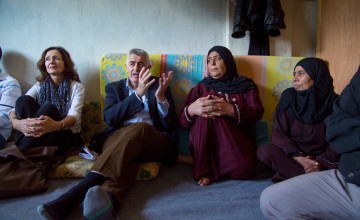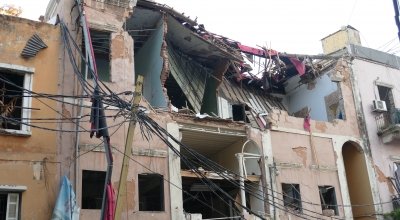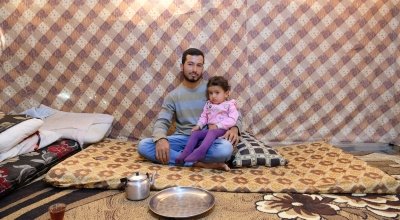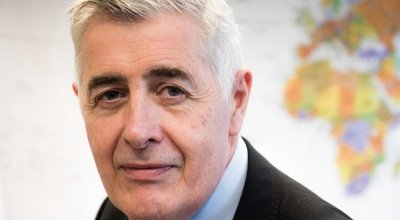
Read our 2023 annual report

Knowledge Hub
In this age of brute militarisation diplomacy may not be dead but it needs revitalised leadership

Ahead of a major conference next week on the future of Syria, Concern Worldwide CEO Dominic MacSorley says Ireland's society, energy and history could help influence necessary change.
Prolonged conflict and human suffering
In September 1961, President John F Kennedy paid tribute to the renowned Swedish diplomat and Secretary-General of the United Nations, Dag Hammarskjöld, who was killed in a plane crash as he travelled to peace negotiations in Congo:
A noble servant of peace is gone. But the quest for peace lies before us. The problem is not the death of one man, the problem is the life of this organization. It will either grow to meet the challenges of our age or it will be gone with the wind, without influence, without force, without respect."
Those words ring chillingly true almost 60 years later. The United Nations, created in the aftermath of perhaps the greatest crisis in the history of humanity, the Second World War, has faced seemingly insurmountable crises before. That is of course to be expected for a body tasked with forging peace and global order in a world characterised by disorder.
The failures of the UN more broadly, are well known and deeply shameful – Rwanda, Srebrenica to name a few – all strike at the heart of the UN’s noble intentions. But the successes of the UN, including preventing further world wars, are rarely celebrated, such is the nature of preventative diplomacy. Good news is no news.
The conflict in Syria however, has presented an unprecedented challenge to the integrity of the Security Council – that existential threat President Kennedy alluded to all those years ago. Never in the history of the Council has there been so prolonged a conflict with such sustained levels of intense violence and human suffering, playing out in front of the eyes of the world every day.
The paralysis of the Council as a mechanism to address the Syrian Crisis has been painfully evident time and time again over the last seven years and the fact now that the United States, United Kingdom and France, three of the five permanent members have chosen to act outside the UN sends another message of fracture.
Prospect of peace has disappeared
The prospect of peace in Syria seems to have now disappeared entirely from the horizon and we appear to be left with brute militarisation at any cost to civilians and reactive strikes with little or no new investment in seeking political solutions.
Such options are irresponsible, evasive and naïve. They only serve to show that the international community has learned nothing over seven years of this war. We have no right to give up on Syria, but what the conflict needs is genuine diplomatic engagement and that individual members of the Security Council become disengaged from the conflict itself.
Easier said than done. At the heart of renewed leadership of the UN Security Council is reform of the Council itself.
Do not dismiss Ireland
In this regard it would be a mistake to dismiss Ireland’s potential involvement to influence necessary change. Despite our modest size, Ireland has a unique standing on the international stage. We are militarily neutral, energetically outward looking, focused on the world’s most vulnerable and, of course, have our own experience of painstaking conflict resolution and peace-building.
Our ambition for a seat on the Council for the 2021-2022 term is therefore a crucial future opportunity to drive real reform of the Security Council.
But of course this doesn’t end the horror today. No one is naive about the complexity of the Syrian Crisis and the only certainty for the future of Syria is that peace will be incredibly difficult to realise and sustain. The country is in ruins in every respect.
We cannot turn our backs
But that doesn’t mean we can turn our backs. It is a deeply revealing shame that the international community can react in such great numbers and so decisively to chemical attacks on two individuals in the UK but cannot be similarly moved to collective, sustained action to pursuing an end to the conflict in Syria.
The Secretary General of the UN has laid out an ambitious plan for a surge of diplomacy for peace but it has been met largely with silence. Ireland knows that the reality of conflict resolution is slow and unglamorous. It requires patience and commitment, creativity and constructive input, and the ability to put egos aside. That is what happened (eventually) at Dayton and in Northern Ireland.
What is needed is robust, revitalised diplomatic leadership from the international community, combined with a reenergised public campaign to bring the international parties to this conflict to account. The war existed before international actors became involved but its most brutal escalation has been the result of this internationalisation. And we need to be clear that this de-escalation of conflict must be the highest priority.
Violence, of the kind diplomacy once resolved, has changed. It is less between states and more about dealing with terrorists. In this age of reactive impatience, diplomacy may not be dead but it needs new leadership. We cannot abandon pressure, diplomacy or influence. Only this, will resolve the crisis in Syria.
---
Concern Worldwide will be participating in a major conference on supporting the future of Syria and the region on April 24 and 25.
Stay in touch
Learn more about our work in the world’s most fragile environments.





